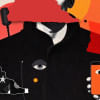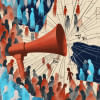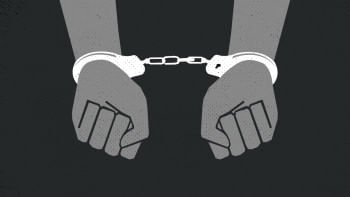Freedom of expression - the only choice

Despite recent terror attacks, Paris joined the New Year's celebrations while Berlin went ahead with the celebration even after police warned of possible terror attacks in Munich. While Paris and Berlin had the spirit to go ahead with New Year celebrations, Dhaka decided to curtail its citizen's right to express joy. The government advised people to be confined in their homes by 8 pm. Police were seen in action, as they diverted vehicles while commuters suffered terrible gridlocks at several points when they tried one road after another to reach their home. Our leaders are probably relieved that New Year's eve passed without any report of sexual harassments or other untoward events. But have we really achieved anything out of this stringent security measure? Almost after every killing of bloggers and publishers, the government and police advised people to not write on secularism or other such issues. Law enforcing agencies strongly echoed this stance and reiterated their commitment to bring anyone who may "hurt religious sentiments" through their writings to book. The fundamentalists who are believed to have masterminded the recent killings in the country have almost achieved what they wanted. Anyone now thinks twice before writing on secularism on social media, blogs or even in newspapers. The term 'blogger' is no longer a symbol of free thinking, rather it is an identity that may pose risks to someone's life. Unfortunately, despite living in a democracy, we seem to have preferred to limit our freedom of expression.
In a bid to nab cyber crime bigwigs and extremists, the government in November last year blocked social media sites like Facebook. The move was not very successful, as youngsters who mostly use social media found alternative ways to use this platform. This indicates the government's desire to control the media backed by Acts (The ICT Act 2013) that give immense power to law enforcing agencies to arrest anyone who appear to "violate" the provisions of such laws. Under this Act, four bloggers were first arrested in April 2013 on allegations of "defaming religion". According to Deutsche Welle, over 100 arrests have been made in Bangladesh under this law since then. The four bloggers haven't been seen writing at all since then. The scenario is quite different in France. In January 2015, after the satirical weekly magazine Charlie Hebdo published an offensive cartoon of Prophet Muhammad (PBUH), protests immediately erupted in many Muslim countries. But the French government stood by the satire magazine only to uphold the state's value of freedom of expression. "France has its principles and it has its values—and freedom of expression is a notable one of these," the French president had said. He was not backing Charlie Hebdo's ideology, but rather defending the value of freedom of expression. That was not all, after the Charlie Hebdo killing, the government pledged $1.2 million to the magazine to ensure its survival. The cartoon was widely criticised by many around the world. Even The New Yorker strongly condemned the satire magazine. This is the spirit of freedom of expression - one has the right to write or say anything s/he likes while others have the right to accept or reject their opinions. On the other hand, in Bangladesh, the space for press, civil society and free thinkers is getting more and more limited. This has also brought us international attention. The European Parliament in November last year, urged the Bangladesh government, among others, "to recognise and respect freedom of the press and media and to allow human rights groups to play an important role in strengthening accountability and documenting human rights abuses; urges the Bangladeshi authorities to revoke the new media policy and abide by their obligations to allow free speech and expression." It may not be wise to compare Bangladesh with France, but is there any scope of denying the fact that the true essence of democracy lies within the space of freedom of expression?
The beginning of the last century witnessed the official birth of socialism and its rapid expansion till 80s. But the ideology, despite being superior when compared to the ideology of capitalism, failed to sustain. Ever wonder why socialism met its fall in its motherland Soviet Union and then globally? I will argue that the "absence of free media" was one of the major reasons. The system had many flaws, but the absence of free media resulted in the absolute failure of socialism, as people did not have any scope to register their grief and grievances. The state controlled media became nothing but a propaganda tool of the Communist Party. The Soviet leaders did not have any scope to know the bare truth and harsh realities of their era. Are we embarking on a similar era in Bangladesh?
The recently held municipal elections were not above criticism, but it is most regrettable that many polling centres were made off limit to journalists. Did we try to hide anything from the eye of the voters? Even if we try, can we really hide information in this age of information technology? We are bombarded with information everyday, thanks to media that has evolved and has become more active over the years. Technological innovation and access to information has revolutionised freedom of expression. The orange revolutions may not be completely successful, but it has established the fact once again that nothing in the world is everlasting. If we really want an effective fourth pillar that will act as a watchdog, we must choose freedom of expression. There is no other alternative.
The writer is a communication for development professional.
Email: [email protected]

 For all latest news, follow The Daily Star's Google News channel.
For all latest news, follow The Daily Star's Google News channel. 







Comments